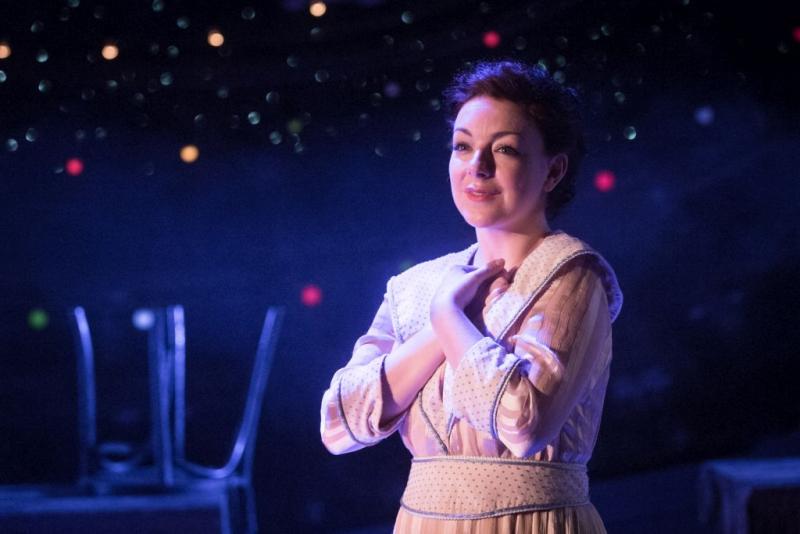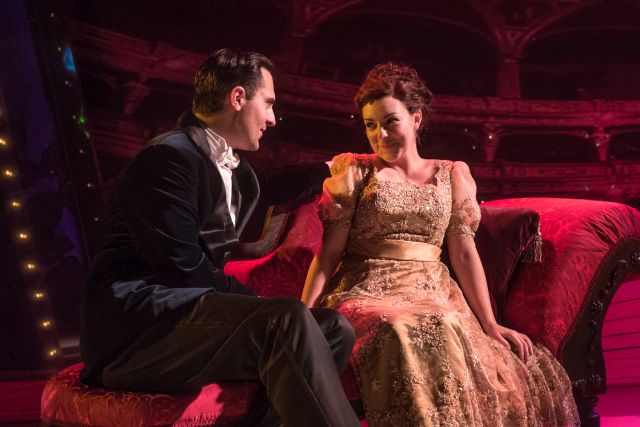Funny Girl, Menier Chocolate Factory | reviews, news & interviews
Funny Girl, Menier Chocolate Factory
Funny Girl, Menier Chocolate Factory
Sheridan Smith confronts the spectre of Streisand

It's hard not to invoke the B word - Barbra, that is, not Brice - and I speak as one who bunked off school to catch her at a midweek matinee when Funny Girl first played London almost 50 years ago. It was standing room only at the Prince of Wales Theatre but by then she was pretty much phoning in her performance, and only the thrill of that voice (smaller than one expected but laser-intense) carried her through.
It's quite the reverse with the very talented Sheridan Smith, who is a funny girl and probably closer in spirit to the real Fanny Brice than Streisand could ever be. And with Isobel Lennart's book now effectively sharpened by Harvey Fierstein for this brand new Michael Mayer staging (and all the Broadway credentials that go with him), the focus has been pulled away from the hit songs towards the comedy and with it the heartache that lies beneath. Fanny's success effectively kills her romance and - irony of ironies - still she has to make people laugh.
 The really special thing about Sheridan Smith is her openness and big-heartedness on stage. She, like Fanny (but unlike Streisand), is a natural comedienne - she simply can't help being funny: the timing, the 36 expressions, the goofy throwaways, all of it is inbred. She works because she's real, and we love her for it. That's what the dashing card shark and all-round wheeler-dealer Nick Arnstein (the suave and ebony-voiced Darius Campbell) falls for and that's the dynamic that makes the show tick. (Smith and Campbell are pictured above)
The really special thing about Sheridan Smith is her openness and big-heartedness on stage. She, like Fanny (but unlike Streisand), is a natural comedienne - she simply can't help being funny: the timing, the 36 expressions, the goofy throwaways, all of it is inbred. She works because she's real, and we love her for it. That's what the dashing card shark and all-round wheeler-dealer Nick Arnstein (the suave and ebony-voiced Darius Campbell) falls for and that's the dynamic that makes the show tick. (Smith and Campbell are pictured above)
All the foreplay between them - in numbers like "You are Woman, I am Man" - is designed to establish an unlikely laugh-a-minute mismatch, and it's only when things get serious and Fanny's devotion, along with her newfound wealth, begins to encroach upon Nick's autonomy and pride that the romantic downturn is signaled.
Will he/won't he stay with her? Is that enough drama for a musical? It is and it isn't. Smith and Campbell play it beautifully and their final scene together is pitch-perfect, genuinely touching. So what is it that's missing? Well, Jule Styne's terrific score sounds thoroughly authentic in Chris Walker's clever arrangements, the ten-piece band retaining the brassy pizzazz of the far more elaborate originals. And there are flavoursome individual turns like Joel Montague's Eddie, who moves like he's slight and wiry when he's anything but, plus the delicious coven of poker-playing Jewish seniors - Gay Soper, Valda Aviks, and the lovely Marilyn Cutts as Mrs Brice - whose bluffing extends far beyond the card table.
 But the score belongs to the lady in the title role - she has its greatest numbers - and whilst Smith can carry them on the sheer force of her personality and her belief in each and every lyric, the singing per se never arrives at that place where it can knock your socks off. The tessitura of "People" is tough for her and where you need vocal intensity, you don't quite get it. Likewise the greatest song in the show, "The Music That Makes Me Dance": if only that other voice wasn't nagging away in our subconscious.
But the score belongs to the lady in the title role - she has its greatest numbers - and whilst Smith can carry them on the sheer force of her personality and her belief in each and every lyric, the singing per se never arrives at that place where it can knock your socks off. The tessitura of "People" is tough for her and where you need vocal intensity, you don't quite get it. Likewise the greatest song in the show, "The Music That Makes Me Dance": if only that other voice wasn't nagging away in our subconscious.
Mayer's production is obviously going to grow in size and Ziegfeld-like scale for its West End transfer: Michael Pavelka's evocative set cleverly conveys a more elaborate context for the show than the tiny Chocoate Factory really allows. And there is a wonderful moment where the essence of what Smith is striving for here is thrown into poignant relief. At the close of act two's big production number "Rat-Tat-Tat-Tat", Fanny, absurdly padded out as the squat and jokily moustachioed Sergeant Schwartz, is left alone on stage, the ubiquitous sad clown who minutes before had the audience eating out of the palm of her hand. Smith can do that - but, truth to tell, the book fares better than the score.
rating
Share this article
The future of Arts Journalism
You can stop theartsdesk.com closing!
We urgently need financing to survive. Our fundraising drive has thus far raised £49,000 but we need to reach £100,000 or we will be forced to close. Please contribute here: https://gofund.me/c3f6033d
And if you can forward this information to anyone who might assist, we’d be grateful.

Subscribe to theartsdesk.com
Thank you for continuing to read our work on theartsdesk.com. For unlimited access to every article in its entirety, including our archive of more than 15,000 pieces, we're asking for £5 per month or £40 per year. We feel it's a very good deal, and hope you do too.
To take a subscription now simply click here.
And if you're looking for that extra gift for a friend or family member, why not treat them to a theartsdesk.com gift subscription?
more Theatre
 The Line of Beauty, Almeida Theatre review - the 80s revisited in theatrically ravishing form
Alan Hollinghurst novel is cunningly filleted, very finely acted
The Line of Beauty, Almeida Theatre review - the 80s revisited in theatrically ravishing form
Alan Hollinghurst novel is cunningly filleted, very finely acted
 Wendy & Peter Pan, Barbican Theatre review - mixed bag of panto and comic play, turned up to 11
The RSC adaptation is aimed at children, though all will thrill to its spectacle
Wendy & Peter Pan, Barbican Theatre review - mixed bag of panto and comic play, turned up to 11
The RSC adaptation is aimed at children, though all will thrill to its spectacle
 Hedda, Orange Tree Theatre review - a monument reimagined, perhaps even improved
Scandinavian masterpiece transplanted into a London reeling from the ravages of war
Hedda, Orange Tree Theatre review - a monument reimagined, perhaps even improved
Scandinavian masterpiece transplanted into a London reeling from the ravages of war
 The Assembled Parties, Hampstead review - a rarity, a well-made play delivered straight
Witty but poignant tribute to the strength of family ties as all around disintegrates
The Assembled Parties, Hampstead review - a rarity, a well-made play delivered straight
Witty but poignant tribute to the strength of family ties as all around disintegrates
 Mary Page Marlowe, Old Vic review - a starry portrait of a splintered life
Tracy Letts's Off Broadway play makes a shimmeringly powerful London debut
Mary Page Marlowe, Old Vic review - a starry portrait of a splintered life
Tracy Letts's Off Broadway play makes a shimmeringly powerful London debut
 Little Brother, Soho Theatre review - light, bright but emotionally true
This Verity Bargate Award-winning dramedy is entertaining as well as thought provoking
Little Brother, Soho Theatre review - light, bright but emotionally true
This Verity Bargate Award-winning dramedy is entertaining as well as thought provoking
 The Unbelievers, Royal Court Theatre - grimly compelling, powerfully performed
Nick Payne's new play is amongst his best
The Unbelievers, Royal Court Theatre - grimly compelling, powerfully performed
Nick Payne's new play is amongst his best
 The Maids, Donmar Warehouse review - vibrant cast lost in a spectacular-looking fever dream
Kip Williams revises Genet, with little gained in the update except eye-popping visuals
The Maids, Donmar Warehouse review - vibrant cast lost in a spectacular-looking fever dream
Kip Williams revises Genet, with little gained in the update except eye-popping visuals
 Ragdoll, Jermyn Street Theatre review - compelling and emotionally truthful
Katherine Moar returns with a Patty Hearst-inspired follow up to her debut hit 'Farm Hall'
Ragdoll, Jermyn Street Theatre review - compelling and emotionally truthful
Katherine Moar returns with a Patty Hearst-inspired follow up to her debut hit 'Farm Hall'
 Troilus and Cressida, Globe Theatre review - a 'problem play' with added problems
Raucous and carnivalesque, but also ugly and incomprehensible
Troilus and Cressida, Globe Theatre review - a 'problem play' with added problems
Raucous and carnivalesque, but also ugly and incomprehensible
 Clarkston, Trafalgar Theatre review - two lads on a road to nowhere
Netflix star, Joe Locke, is the selling point of a production that needs one
Clarkston, Trafalgar Theatre review - two lads on a road to nowhere
Netflix star, Joe Locke, is the selling point of a production that needs one
 Ghost Stories, Peacock Theatre review - spirited staging but short on scares
Impressive spectacle saves an ageing show in an unsuitable venue
Ghost Stories, Peacock Theatre review - spirited staging but short on scares
Impressive spectacle saves an ageing show in an unsuitable venue

Add comment